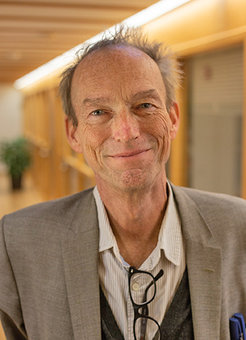Ethnology of the Smart Phone: Lecture by Thomas Hylland Eriksen
On 12 June 2019, Norwegian anthropologist Thomas Hylland Eriksen will give a talk entitled “To See the World in a Grain of Sand: The smartphone and comparative anthropology” at the Max Planck Institute for Social Anthropology. Eriksen, an External Scientific Member of the MPI, has reached a wide public audience with his theory of the overheating of the world. In this lecture he takes an anthropological look at the consequences of the worldwide prevalence of smart phones. The lecture will be held in English and starts at 18:00.

Prior to his visit in Halle we asked Thomas Hylland Eriksen about his upcoming talk, his work, and his future plans. We also asked about his current reading and what advice he would give to current students of social anthropology.
You became affiliated with the MPI as an External Scientific Member in 2018. What personal and scientific ties do you have with the MPI?
I have for years engaged and collaborated with the Max Planck Institute for the Study of Religious and Ethnic Diversity in Göttingen, as well as the MPI in Halle. In the case of Göttingen, we have worked with Steven Vertovec’s concept of superdiversity as well as basic questions concerning social cohesion, transnationalism, and identity politics in complex settings. Regarding Halle, I have collaborated with Chris Hann for years, and he had a visiting professorship in my recent ERC project ‘Overheating’, but I have also worked with several others at the Institute on issues ranging from cultural property rights to creolisation.
How is the topic of your talk in Halle on the global proliferation of smartphones connected to your theoretical work on overheating and acceleration?
There is a direct connection. The driving forces in accelerated, ‘overheated’ globalisation are neoliberal, transnational capitalism and technological development; the smartphone is increasingly the medium that mirrors and reflects these changes, while at the same time producing its own overheating effects in the acceleration, compression, and intensification of everyday life.
What new insights can the anthropological perspective on smartphones add to the broader ongoing discussion of how new communication technologies change the world?
An obvious task for anthropology is to document diversity, thereby saying something about the distinctiveness of the social worlds in question. Both use of and discourse about smartphones varies much more than many are aware of. In addition, we may have interesting things to say about the transformation of social relationships and other features of the contemporary world which can only be understood at the micro-level using ethnographic and comparative methods.
What are your plans for the future?
If I have a future – my health is not great – I will continue to do research on local responses to global or transnational processes. I have an ongoing project in the Seychelles about small scale in the context of intensified globalisation, which I hope to expand to include other small-scale societies as well.
Why did you become an anthropologist?
It somehow seemed both inevitable and a coincidence at the time; I had mixed feelings about academia in general, but fell in love with anthropology as a young man – its insistence that all human lives are valuable and interesting, its oscillation between the very small and the very big, and its insistence on raising basic questions of social theory and indeed of philosophy through the lens of ethnography and comparison. To me, this was – and remains – a powerful cocktail, bound to stimulate intellectual curiosity as well as existential engagement.
What advice would you give to students studying social anthropology today?
Never lose your passion. All good research has an existential dimension, making the reader feel that something important is at stake. Mere cleverness never got us anywhere.
What text – whether a book or article – have you read recently that particularly impressed you?
I have only recently discovered Vilém Flusser’s rich and provocative media philosophy, and have recently enjoyed and learned from his Does Writing Have A Future?, which delves into the tactility of handwriting at length. For someone whose handwriting for years has been all but illegible, his analysis is of particular interest, naturally.
